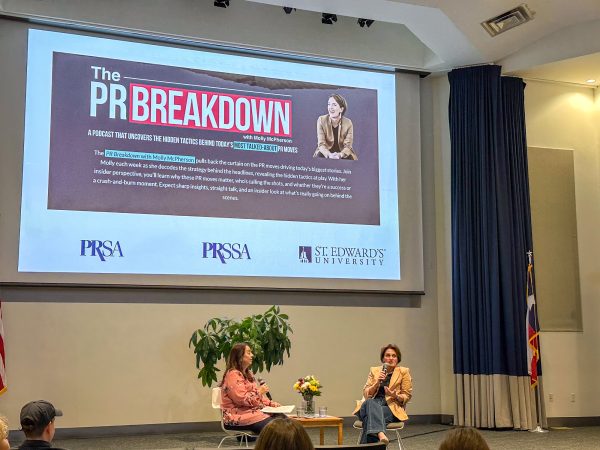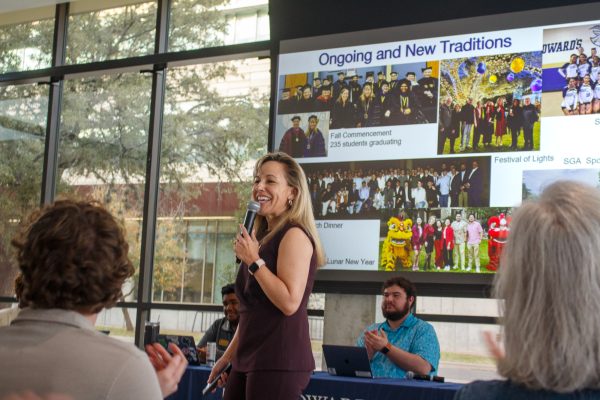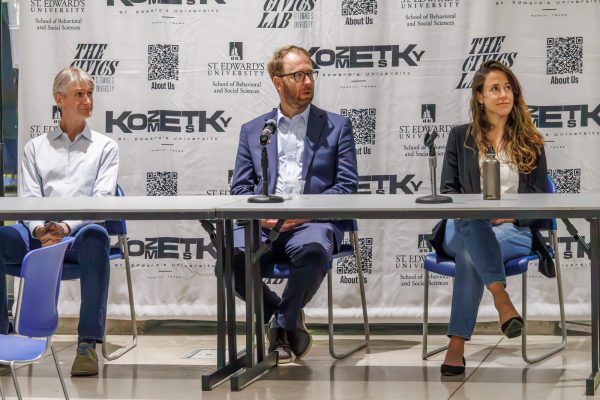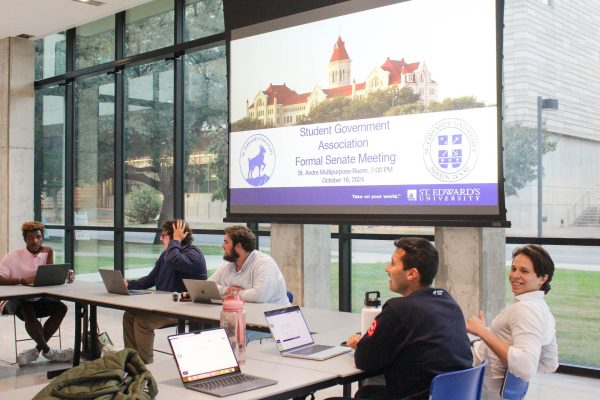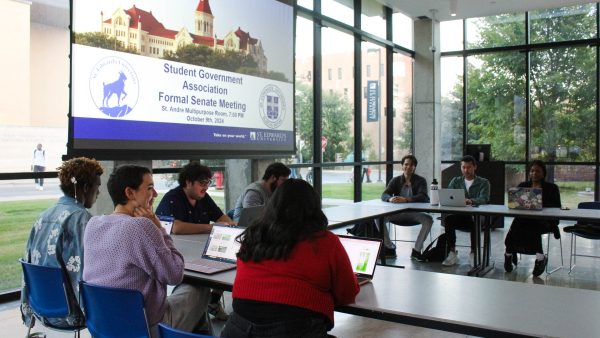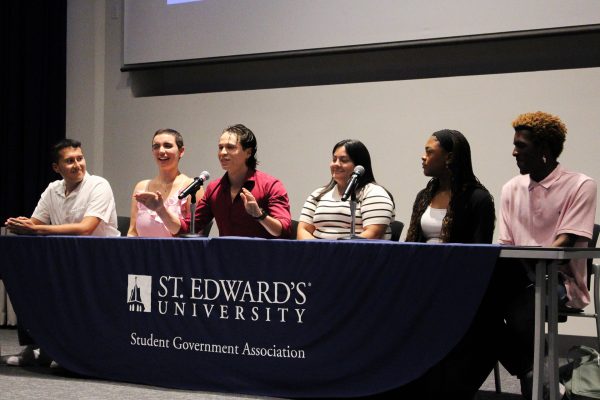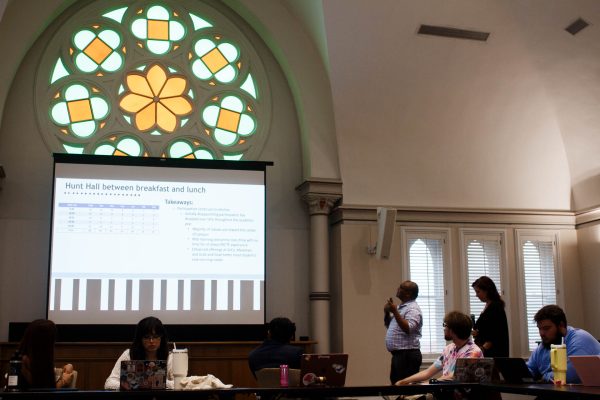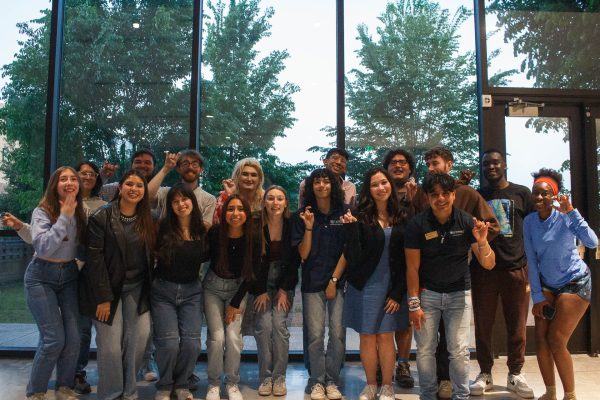SGA supports bill to back sign language course
St. Edward’s University is located right down the street from the Texas School for the Deaf in a city where 8.8 percent of the population is deaf or hard of hearing, according to the Mayor’s Office. However, American Sign Language (ASL) is not offered as a course at St. Edward’s.
Emily Kivett, a sophomore global studies major and music minor, is trying to change that.
“It’s important to me because St. Ed’s is right in the middle of a huge population of deaf culture and deaf events,” Kivett said.
ASL has impacted Kivett’s life personally. Kivett, who is from Northern California, became fluent in high school when she first became friends with a deaf student, Amy Eyre, in her English class. When Kivett realized she was more intrigued by Eyre and her interpreter than her English teacher, she introduced herself to Eyre by writing a note on paper.
“I had never seen or met a deaf person before. I had never seen sign language,” Kivett said.
Kivett began learning sign language from Eyre and fulfilled her high school language requirement by taking ASL courses at a local junior college.
Today, Kivett is the president of St. Edward’s American Sign Language Club, which is a student organization on campus aiming to provide an outlet for people who are interested in deaf culture and events in Austin. Last semester, the club taught ASL lessons and would visit the Texas School for the Deaf. It is a relatively new club, this being its second year on campus.
Currently, Kivett is gauging student interest in ASL courses and has collected approximately 168 surveys to support her argument that the university offer ASL as a foreign language.
The surveys ask four questions: did you know that St. Edward’s doesn’t offer ASL as a course you could take? Do you think it would be valuable to have ASL offered on campus? If it was available to you, would you take an ASL course? Even if you would not take it, do you still think there is value to having it on campus?
The majority of the results favored offering ASL at St. Edward’s. Out of 168 people, only 20 said they would probably not take an ASL course, and 19 of those said they still thought it would be valuable to have on campus.
Renee Cornue, a sophomore at St. Edward’s, supports Kivett’s idea. Had she not already fulfilled her language requirements, Cornue would have chosen to take ASL when she was a freshman.
“I definitely think it should be offered. We don’t have as many language options as a lot of other schools and I think ASL is a really important one that should be incorporated,” Cornue said.
Kivett’s next step was bringing the survey numbers to the Student Government Association in the form of a bill written by Kivett with the help of SGA members. Ryan Miller, a junior and SGA senator, decided to sponsor Kivett’s bill.
“The reason why it interested me was because I actually thought there was an American Sign Language class on campus, but when I heard there wasn’t…I was kind of shocked. Especially with the ASL club really wanting it and knowing a few of them personally, I was like yes, I’ll fully support it,” Miller said.
In order for Kivett’s bill to move forward, it needed to garner a majority vote from SGA senators. It passed first passage unanimously.
“Emily wrote an amazing bill. It was very well-written, very concise,” Miller said.
Kivett also noted that St. Edward’s is the only university she has come across in Austin and greater central Texas that does not offer any ASL courses. University of Texas at Austin, Austin Community College, Texas A&M University at College Station and Rice University all offer ASL courses.
Some St. Edward’s students are excited about the possibility of ASL being offered on campus, and hope it will be implemented soon so they can take the course before graduating.
Kate Meyer, a sophomore at St. Edward’s, is one student that would like to take the course.
“I’ve always really wanted to learn ASL, especially since we have the deaf high school here and I’ve met some of those people. I thought it would be really cool to be able to communicate with them so I really want to take it [ASL] at some point in my life,” Meyer said.
The next step for Kivett’s bill will be final passage, which does not have a set date yet. It will take place when all the research is done and the specific goal is presented clearly. Getting more student and faculty interest as well as SGA’s support is necessary to push the bill forward to the administrative level, which Kivett hopes will take place before the end of the semester.
Kivett is confident that the bill will ultimately make a difference at St. Edward’s.
“I’m so excited, I can’t wait to see where this goes. I have all the confidence in the world in it, that it’s going to go through, it could very well be established as soon as next fall,” Kivett said.




